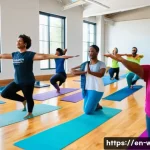Ever feel like you’re meant for something more, something that genuinely helps people thrive? I’ve been wrestling with that feeling for a while now, and honestly, the traditional 9-to-5 just wasn’t cutting it anymore.
The idea of a well-being coordinator – someone who guides others towards healthier, happier lives – really resonated with me. It’s a role where you can make a tangible difference, and that’s incredibly appealing.
Plus, the wellness industry is booming, adapting to trends like personalized wellness plans driven by AI insights and the growing demand for mental health support in the workplace.
Let’s dive into the details in the article below.
## Exploring the Appeal: Why the Well-being Coordinator Role is Drawing So Much AttentionThe allure of becoming a well-being coordinator lies in its multifaceted nature.
It’s not just about promoting physical health; it’s about fostering a holistic sense of well-being that encompasses mental, emotional, and even social aspects.
From what I’ve seen, people are increasingly recognizing the interconnectedness of these elements and seeking guidance to achieve balance in their lives.
The beauty of this role is that you get to be that guide, helping individuals navigate the complexities of modern life and build resilience against stress and burnout.
It’s about empowering them to take control of their health and happiness, creating a ripple effect that extends to their families, communities, and even the workplace.
For example, I know one company implemented a well-being program led by a coordinator, and they saw a significant decrease in employee sick days and a boost in overall morale.
That kind of impact is truly rewarding.
The Growing Demand in a Stressed-Out World

– We live in a high-pressure society where chronic stress has become the norm. This has created a huge need for professionals who can teach coping mechanisms, stress-reduction techniques, and healthy lifestyle habits.
– Think about the number of people you know who are constantly juggling work, family, and personal responsibilities. They’re often so overwhelmed that they neglect their own well-being.
A well-being coordinator can provide them with the support and resources they need to prioritize self-care.
More Than Just Fitness: A Holistic Approach
– Gone are the days when well-being was solely defined by physical fitness. People are now recognizing the importance of mental and emotional health, as well as social connection.
– As a well-being coordinator, you’ll be equipped to address all aspects of well-being, from nutrition and exercise to mindfulness and stress management.
This holistic approach is what sets this role apart and makes it so impactful.
Essential Skills and Qualities for Success in Well-being Coordination
Transitioning into this field requires a blend of technical knowledge, interpersonal skills, and a genuine passion for helping others. It’s not just about knowing the latest wellness trends; it’s about understanding human behavior, building rapport, and inspiring lasting change.
In my experience, the most effective well-being coordinators possess a strong sense of empathy, excellent communication skills, and the ability to create personalized plans that meet the unique needs of each individual.
They are also proactive in staying updated on the latest research and best practices in the field, ensuring that they provide the most relevant and effective guidance.
Think of it like being a life coach, but with a specific focus on health and well-being.
Deep Knowledge of Wellness Principles
– You’ll need a solid understanding of nutrition, exercise, stress management, and other key aspects of well-being. This could come from a formal education in health sciences, certifications, or relevant professional experience.
– Being aware of current trends, like the incorporation of digital wellness tools or the increasing focus on sleep hygiene, is also crucial for staying relevant.
The Empathy and Communication Powerhouse
– The ability to connect with people on a personal level and build trust is paramount. You’ll be working with individuals from diverse backgrounds and with varying levels of motivation, so adaptability and empathy are key.
– Being able to clearly communicate complex information in a way that is easily understandable and actionable is also vital.
Navigating Certification and Education Pathways to Become a Well-being Coordinator
While a specific “well-being coordinator” degree doesn’t exist (yet!), there are numerous pathways you can take to gain the necessary knowledge and credentials.
Many professionals come from backgrounds in health education, nursing, social work, or even human resources. Certifications in areas like health coaching, wellness program management, or specific modalities like yoga or mindfulness can also be highly valuable.
The key is to identify your areas of strength and interest and then tailor your education and training to align with your career goals. I’ve seen people successfully transition into this role with a combination of formal education, professional certifications, and on-the-job experience.
Formal Education Options: Building a Solid Foundation
– A bachelor’s degree in health education, nursing, social work, or a related field can provide a strong foundation in health principles and behavioral change techniques.
– Some universities also offer specialized programs in wellness management or health promotion, which are specifically designed to prepare students for careers in the wellness industry.
Certification Programs: Specializing Your Skills
– Certifications in health coaching, wellness program management, or specific modalities like yoga, meditation, or nutrition can demonstrate your expertise and enhance your credibility.
– Organizations like the National Wellness Institute and the American College of Sports Medicine offer reputable certifications that are widely recognized in the industry.
Crafting Your Resume and Portfolio to Showcase Your Well-being Expertise
When applying for well-being coordinator positions, it’s essential to highlight your relevant skills, experience, and certifications. Your resume should clearly demonstrate your knowledge of wellness principles, your ability to develop and implement effective programs, and your track record of achieving positive outcomes.
Consider including specific examples of how you have helped individuals improve their health and well-being, whether through individual coaching, group workshops, or community initiatives.
A portfolio showcasing your work, such as sample wellness plans, presentations, or articles, can also be a valuable asset. I once helped a friend revamp her resume to emphasize her experience leading employee wellness challenges, and she landed her dream job within a month.
Highlighting Relevant Skills and Experience

– Focus on transferable skills like communication, empathy, problem-solving, and program management. Be sure to quantify your achievements whenever possible, using metrics to demonstrate your impact.
– If you have experience in related fields, such as health education or human resources, emphasize the skills and knowledge that are directly relevant to well-being coordination.
Showcasing Your Passion and Commitment
– Well-being coordinators are passionate people. Include volunteer work or personal projects related to health and wellness. – A well-crafted cover letter can be an opportunity to express your passion for helping others and your understanding of the unique challenges and opportunities in the wellness industry.
Understanding the Salary Expectations for Well-being Coordinators
Salaries for well-being coordinators can vary depending on factors such as experience, education, location, and the type of organization. According to recent data, the median salary for health educators and community health workers (a closely related occupation) in the United States is around \$50,000 per year.
However, salaries can range from \$40,000 to \$70,000 or more, depending on the specific role and employer. Keep in mind that these are just averages, and your actual salary may be higher or lower depending on your individual circumstances.
It’s always a good idea to research salary ranges for similar positions in your area to get a better sense of what you can expect. For example, I know a well-being coordinator with a master’s degree and several years of experience who earns over \$80,000 per year.
Influence Factors on Salary
– The organization’s size and budget: Larger companies or healthcare systems often have more resources to invest in wellness programs and may offer higher salaries.
– Your education level: A higher degree or specialized certifications can increase your earning potential. – Location plays a big part; metropolitan areas often have a higher cost of living and thus, better compensation.
Building Your Professional Network: Connecting with Others in the Well-being Field
Networking is crucial for career advancement in any field, and well-being coordination is no exception. Attending industry conferences, joining professional organizations, and connecting with other professionals on LinkedIn can help you expand your knowledge, learn about job opportunities, and build valuable relationships.
Consider volunteering at local wellness events or joining a community health coalition to gain experience and connect with like-minded individuals. I’ve found that networking is not just about getting a job; it’s about building a supportive community that can help you grow and thrive in your career.
I once attended a wellness conference and met a mentor who completely changed the trajectory of my career.
Strategic Networking Tips
– Local wellness events or health fairs are a great way to meet people face to face. – Online groups or forums can be a good place to get advice or share ideas.
– Don’t be afraid to reach out to people whose work you admire and ask for informational interviews. Here is a table summarizing the different pathways into becoming a well-being coordinator:
| Pathway | Education/Certification | Skills Gained | Typical Roles |
|---|---|---|---|
| Health Education | Bachelor’s or Master’s in Health Education | Health promotion, program planning, communication | Wellness Specialist, Health Educator |
| Nursing | Registered Nurse (RN) license | Patient care, health assessment, disease prevention | Wellness Nurse, Occupational Health Nurse |
| Human Resources | HR certification (e.g., SHRM-CP) | Employee benefits, HR policies, wellness program design | Benefits Coordinator, Wellness Program Manager |
| Health Coaching | Certified Health Coach | Behavior change, goal setting, motivational interviewing | Health Coach, Wellness Coach |
The journey to becoming a well-being coordinator is a rewarding one, filled with opportunities to make a tangible difference in people’s lives. It requires dedication, continuous learning, and a genuine passion for helping others thrive.
If you’re drawn to this field, I encourage you to explore the various pathways available and take the first step towards a fulfilling career in well-being.
Wrapping Up
Embarking on a career as a well-being coordinator is an exciting venture, presenting numerous opportunities to positively impact lives. It necessitates commitment, ongoing education, and a genuine enthusiasm for supporting others in their journey to wellness. If this field resonates with you, I encourage you to explore the diverse paths available and take the initial stride toward a fulfilling career in well-being.
Good to Know Info
1. Stay updated with the latest wellness trends by subscribing to industry newsletters and following leading wellness experts on social media.
2. Consider joining a local Toastmasters club to hone your public speaking and communication skills.
3. Volunteer at a local community center or non-profit organization to gain hands-on experience in wellness program implementation.
4. Network with professionals in related fields, such as nutritionists, personal trainers, and mental health counselors, to expand your referral network.
5. Explore opportunities for continuing education, such as workshops, seminars, and online courses, to deepen your knowledge and skills.
Key Takeaways
A career as a Well-being Coordinator combines passion with purpose, offering varied routes to entry. Embrace continuous learning and build a strong professional network to excel. The role offers flexibility, allowing you to impact lives through various health strategies and programs.
Frequently Asked Questions (FAQ) 📖
Q: What exactly does a well-being coordinator do?
A: From my own experience researching this field, a well-being coordinator is like a supportive guide. They work within organizations, often in corporate settings or even schools, to create and implement programs that promote employee or student health and happiness.
Think organizing wellness workshops, connecting people with mental health resources, or even just facilitating team-building activities. It’s really about creating a culture where people feel supported in their overall well-being, both physically and mentally.
I’ve even seen some coordinators personalizing wellness plans based on individual needs – pretty cool stuff!
Q: How does the growing use of
A: I impact the role of a well-being coordinator? A2: That’s a great question! The rise of AI in wellness actually makes the coordinator’s job more strategic and personalized.
AI can analyze data to identify wellness trends or individual risk factors, but it’s the coordinator who interprets that data and uses it to create targeted and engaging programs.
Imagine AI pinpointing a spike in stress levels within a specific department. The coordinator could then tailor a stress-management workshop specifically for that team.
It’s like AI is the smart tool, and the coordinator is the skilled craftsman using it to build a better wellness experience.
Q: Is this a stable career path, and what kind of qualifications would I need?
A: Definitely! Given the increasing focus on employee well-being and the growing awareness of mental health, the demand for well-being coordinators is on the rise.
I’ve noticed more and more companies are starting to invest in these roles. As for qualifications, a background in health promotion, psychology, human resources, or a related field is a solid start.
Strong communication and organizational skills are essential. Certification in wellness coaching can also be a huge plus. Honestly, though, I think genuine empathy and a passion for helping others are just as important.
It’s all about connecting with people and building trust.
📚 References
Wikipedia Encyclopedia




